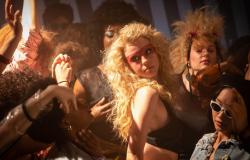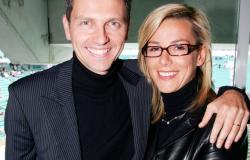It is not because we are wary of the vengeful temptation of certain neofeminists and their taste for manhunting that we should refrain from stopping when, in the polyphony of feminism of today, a just and vital voice is heard. Deborah Levy’s is all that, and more: she’s inspiring. We have not completely recovered from the autobiographical trilogy* which earned the British writer, in 2020, the discovery of the French public and the winning of the Femina Foreign Prize. Since then, she has been treated like a star in the literary circles of Paris – a city where the Londoner, who spent more and more time there, ended up renting an apartment a year ago.
Book: Dany Jucaud, the girl who looked the stars in the eyes
We rushed to the latest, or rather the latest-published-in-France, Hot Milk, a novel she wrote… in 2016. And we were not disappointed. But troubled, yes, troubled. Deborah Levy takes us to the heart of stifling Andalusia in August, between the long tentacles of jellyfish which infest the sea and devour with stings the body of her heroine, Sofia, a 25-year-old Englishwoman forgetful of herself. even – as well as his anthropology thesis, suspended while waiting for better days – for the benefit of the care given to his mother, the hypochondriac and monopolistic Rose. Moreover, the daughter and the mother came to Almería so that the second could follow the treatment of Doctor Gómez, provided in the clinic of the same name for the modest sum of twenty-five thousand euros, “to try to figure out what’s wrong with his legs” – as Sofia explains to the student in charge of tourists’ jellyfish stings in the infirmary shed at the end of the beach.
The liberation of Sofia – vis-à-vis her impossible mother like the sermons of Doctor Gómez enjoining her, to fight against her apathy, to “gain intrepidity”, or even the windowless room assigned to her by a father whom she has not seen since she was 14 – will go through the jellyfish. And more precisely by the venom released in it by the sting. “A sting of desire”, indicates the narrator twice. “A huge desire. » It is his desire, lively and exalted – and first of all for a German woman wearing alternately men’s dancing shoes and silver gladiator sandals laced up to the top of her calves, Ingrid Bauer – which will allow him to get closer of herself. Moral number one: desire saves. Sofia, you and me. All of us.
So thank you, ladies jellyfish. Deborah Levy, who is in her own way – oddly poetic – an evangelist of intelligent feminism, placed this novel under the high patronage of La Méduse de Cixous. In fact, a quote from Laughing Medusathe manifesto text that Hélène Cixous published in 1975 in the issue of The Arch devoted to Simone de Beauvoir and the struggle of women and in which she deconstructs the myth of the Medusa femme fatale, bewitching and necessarily dangerous for men.
Irony ends in sensual incandescence – unless it is the opposite
Almost fifty years after this founding text, the jellyfish still laughs, and even more so, with Deborah Levy. “I want a bigger life,” assures Sofia in the first pages of Hot Milkwhere the British writer mischievously lampoons the belief that, to succeed, one must be strong and courageous, “intrepid”, in the words of Doctor Gómez which becomes that of Sofia – and the refrain of the novel. “I need to be more fearless”, “I am becoming fearless”, etc.
Irony ends in sensual incandescence – unless it is the opposite. The sea bream scene, the allegorical culmination of this injunction to intrepidity which innervates the text, is a piece of humorous anthology. Of which Doctor Gómez, again, is the spur: “Why don’t you steal a fish at the market to gain intrepidity? he suggests to Sofia. Don’t take the biggest one, but not the smallest one either. » The trip to the fish market turns into an amused variation on shades of intrepidity (read excerpt opposite). Ultimately, it is to devour the sea bream thus stolen by her care that Sofia invites the first object of her desire, Ingrid, then the second object, the student from the beach infirmary. “It’s the beginning of a more intrepid life,” she notes. We will understand that these annotations take the place of scansion as much as sarcasm of the author. Later, after a “night of fearless love” where the student will have kissed “every jellyfish sting on [s] we body, the welts and the blisters”, Sofia concludes: “I can say that I am very fearless. » Deborah Levy doesn’t just play rehearsal comedy. The poet multiplies the resonances and other echoes: with her, the words, the images, the invocations, the sounds respond here and there in the text. “My love for my mother is an axe. It hurts seriously,” can be read twice, forty pages apart. Between the two, the ax has left its status as a metaphor to materialize – and cut a snake in two… And when this refrain returns a little before the end, it is amputated from the second part: from now on, it is the mother who “threatens to cut his feet with it” the famous axe…
If the latter hovers spectrally above the novel, the first of the recurring motifs which are as if woven into the fabric of the text is the broken screen of Sofia’s computer with its constellations of“shattered stars” : appearing on the first page, these constellations will punctuate the sky of the book until the end. Two lines after yet another mention of these “shattered stars Made in China”, it’s the “false Greek vase with its frieze of female slaves carrying jars of water on their heads” which Sofia throws to the ground and which he too “shatters”. From one symbol to another. From one matrix to another. Because how to get out of it? It all starts from there. From the mother, from the placenta, from the breast, ” breastmilk “ – there is no question for Deborah Levy of omitting the adjective, on the contrary she almost maniacally enjoys never detaching the ” milk “ of its qualifier, and to draw out the two words stuck together again and again. In an attempt to convince Sofia’s mother to go see the statue of the Virgen del Rosario, Doctor Gómez does not tell her that it is made of marble having “the color of breast milk” ? This ” breastmilk “, we will touch it when Sofia meets her 3-month-old little sister. This one “pays attention only to the stunning milk in his mother’s womb”, which, notes the narrator, has “wet spots of breast milk on her blue denim blouse” and refuses to drink coffee because “caffeine would pass into her breast milk”. Alas, who produces ” breastmilk “ does not necessarily overflow from this ” rare commodity ” that Deborah Levy calls the “milk of human tenderness”… This is the moral (number two) of this very beautiful milky novel.
* What I don’t want to know, The cost of living And State of playpublished by Éditions du Sous-Sol.






